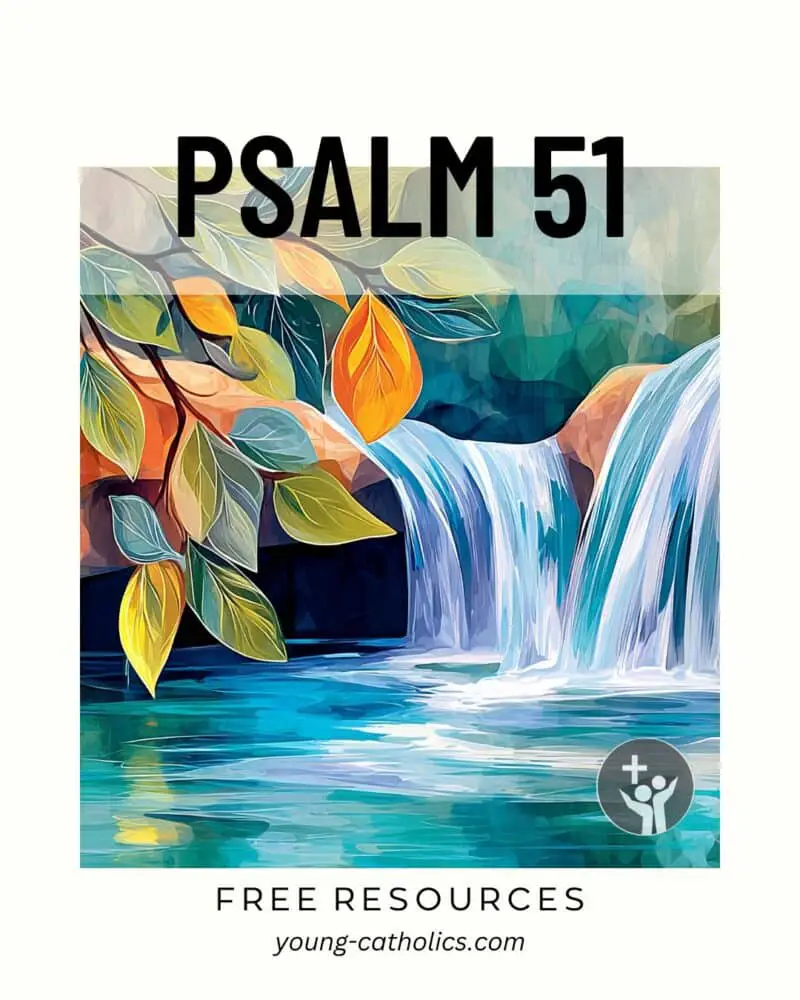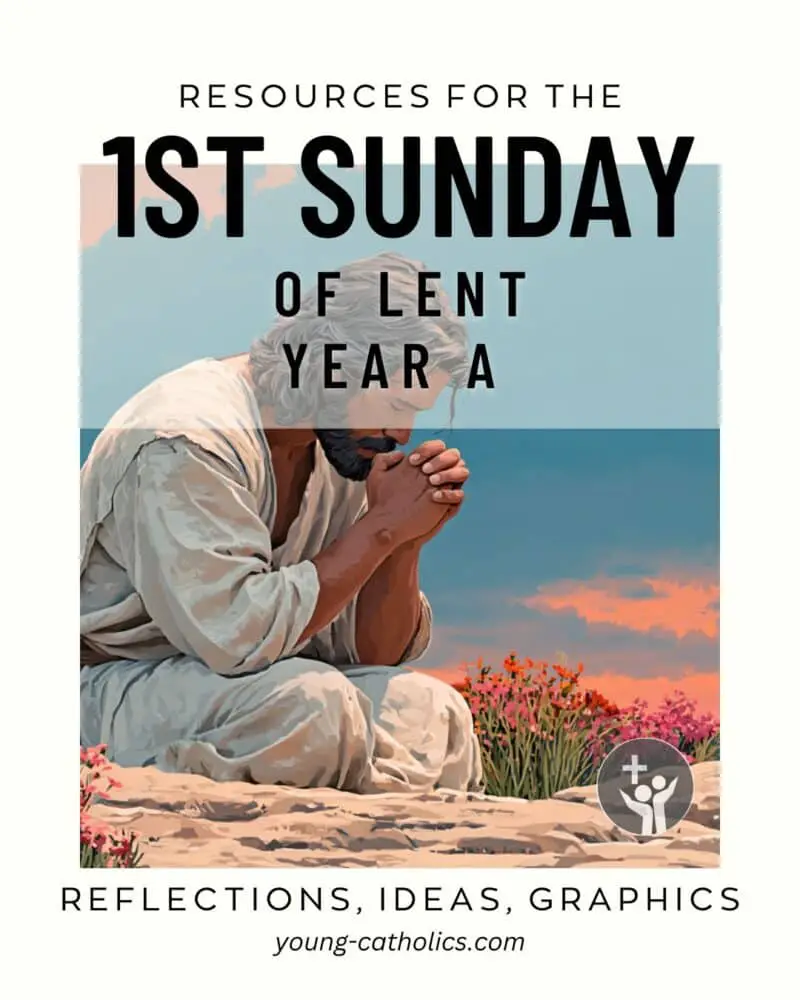Psalm 51

Psalm 51 is one of the most well-known prayers for mercy in the Bible. It is often called the Miserere, based on the first word of the Latin version. The psalm is a cry for forgiveness from someone who knows they have sinned. It helps us put into words our own sorrow and need for God’s mercy.
Tradition connects this psalm to King David. After he sinned with Bathsheba and was confronted by the prophet Nathan, David turned to God in prayer. This psalm reflects his guilt, but also his trust that God will forgive. It shows a person who does not hide from the truth but brings it to God.
Psalm 51 speaks to anyone who feels broken or ashamed. It reminds us that sin does not have the last word. God’s mercy is always greater. The psalm helps us come back to God when we feel far away or unworthy.
This psalm is used often in the Church. We hear it during Lent, especially on Ash Wednesday. It is also used in the Liturgy of the Hours. Many Catholics pray it privately when they are sorry for something they have done. It shows that even when we fall, we can ask for a new heart and a fresh start with God.
A Cry for Mercy from a Fallen King
This psalm is found in the second book of the Psalms, which includes Psalms 42 through 72. These psalms often focus on prayer during times of trouble. Many of them are linked to the life of King David. They show both personal struggles and trust in God.
The heading before the psalm tells us it was written by David. It says he wrote it after the prophet Nathan came to him. This happened after David committed serious sins. He took Bathsheba, another man’s wife, and arranged the death of her husband, Uriah. When Nathan told David a story that helped him see his sin clearly, David was filled with guilt and sorrow.
David turned to God in prayer. He didn’t make excuses. He asked for forgiveness and a clean heart. This psalm is his prayer. It has been used for centuries by people who feel the weight of sin and want to come back to God.
Turning Back with Trust
One of the biggest themes in this psalm is mercy. The person praying knows they have done wrong but still turns to God with hope. Catholics believe that God is always ready to forgive when we are truly sorry. This psalm reminds us that no sin is too big for God’s mercy.
Another theme is cleansing. The psalm asks to be washed clean. In Catholic life, this points to the Sacrament of Reconciliation. Just like the psalmist, we come to God with a sorry heart and ask for a fresh start. The words of this psalm help express what many feel before going to confession.
The psalm also talks about having a clean heart and a right spirit. Catholics know that true change comes from the grace of God. We need more than just saying we are sorry. We need God to help us become better. This psalm shows how that change begins with prayer.
Finally, the psalm reminds us that God cares more about the heart than about outward actions. Sacrifices or good works mean little if we don’t mean them. God wants honesty. This matches what Jesus later taught. Real faith begins on the inside.
A Prayer That Still Fits Today
his psalm is still important for us today. Everyone makes mistakes. Everyone sins. Sometimes we try to hide it or blame others. But this psalm teaches us to face the truth and turn to God. It shows us how to say we are sorry and ask for help.
Many people feel broken or unworthy. This prayer reminds us that God listens. It helps us believe that we can always begin again. When we feel lost or ashamed, the words of this psalm give us a way to talk to God.
In Catholic life, this psalm fits well with confession and penance. It helps prepare our hearts before we go to the Sacrament of Reconciliation. It also helps after confession, when we want to thank God for mercy and pray to stay on the right path.
This psalm can be used anytime. We can pray it during Lent, before Mass, or in quiet moments at home. It keeps us honest with ourselves and open to God’s love.
A Prayer Based on Psalm 51
Start Me Over, God
God, I messed up again.
I said things I shouldn’t have said.
I hurt people I care about.
I tried to hide it, but you see everything.
Please don’t turn away from me.
I’m tired of pretending.
I want to be real with you.
Wash away the mess I made.
Give me a clean heart.
Make me new inside.
Help me choose what’s right,
even when it’s hard or no one’s watching.
Give me strength to say no
to things that pull me away from you.
Put your Spirit in me.
I don’t just want to look good on the outside.
I want to be good on the inside.
Teach me to care about truth.
Teach me to be kind,
even when I’m angry or hurt.
God, don’t give up on me.
Stay close, even when I fail.
Give me the joy of being your child again.
And help me show others the way back too.
A Psalm We Hear in Church
This psalm is used often in the Church’s prayer and worship. It is the Responsorial Psalm for Ash Wednesday, the first day of Lent. On that day, we are reminded to turn away from sin and believe in the Gospel. The words of the psalm help us ask for mercy and begin the season with honesty and hope.
It also appears in the Liturgy of the Hours. Priests, deacons, and many lay people pray it early on Friday mornings. This helps the Church remember the suffering and mercy of Jesus, who died on a Friday.
Sometimes, parts of the psalm are used in other Masses, especially when the readings talk about repentance. Its words are a good fit for days when we are asked to look at our lives and ask how we can grow closer to God.
The Church gives us this psalm again and again. It is a prayer we never outgrow. Click on a link below for more information and resources for a specific responsorial psalm.

5th Sunday of Lent Year B
A Prayer for a New Start
Psalm 51:3-4, 12-13, 14-15 is a simple but honest cry for mercy. The person praying knows they have sinned and asks God to clean their heart and take away guilt. They don’t just want to be forgiven—they want to be changed from the inside. They ask God to stay close and not take His Spirit away.
The psalm also shows a desire to help others. Once healed and forgiven, the person wants to guide others back to God too. It’s not just about personal peace, but about sharing hope. This prayer fits well during Lent, when we focus on turning back to God and letting Him renew us.

24th Sunday in Ordinary Time Year C
Returning with a Humble Heart
Psalm 51:3-4, 12-13, 17, 1 is a quiet prayer for mercy and a new beginning. The one praying admits their sin and asks God to wash them clean. They want to be close to God again and ask Him not to leave them. The prayer is full of trust that God will hear and forgive.
It also shows the kind of worship God wants. He doesn’t ask for grand gifts or perfect actions. He wants honesty, sorrow for sin, and a humble spirit. When we come to Him with a broken heart, He welcomes us. This fits with the message of the lost son in the Gospel—God is always ready to forgive when we return.

1st Sunday of Lent Year A
Starting Lent with Honest Prayer
Psalm 51:3-4, 5-6, 12-13, 17 is a personal prayer asking for mercy. The one praying admits their sin and turns to God for cleansing. They know they have done wrong and ask to be made new. The request is not only for forgiveness, but also for a clean heart and a strong spirit.
The psalm also asks for joy to return. It ends with a promise to praise God once restored. This fits the beginning of Lent, when we are called to turn back to God. The prayer reminds us that God listens when we are honest, and that He can give us a fresh start.

Ash Wednesday
Beginning the Journey with Mercy
Psalm 51:3-4, 5-6ab, 12-13, 14 and 17 sets the tone for Ash Wednesday and the whole season of Lent. It is a prayer of honesty and hope. The one praying admits their sin without excuse and turns to God for cleansing. There is a deep desire to be made new, not just on the outside, but in the heart and spirit.
The prayer also asks God not to leave. It pleads for His presence, His Spirit, and the joy that comes with being close to Him. This message is perfect for Lent. It reminds us that returning to God starts with truth, but it leads to joy. We don’t stay in sadness. We are renewed so we can praise again.

Easter Vigil Mass
Renewed for New Life
Psalm 51:12-13, 14-15, 18-19 is an honest prayer for a fresh start. The person praying asks for a clean heart and the return of God’s Spirit. They want to feel the joy of salvation again. They also hope to help others find their way back to God.
The psalm makes it clear that God cares more about a humble heart than about offerings. True worship starts inside. This fits well with the Easter Vigil, when we celebrate new life in Christ. It reminds us that real change begins with grace and leads us to share that joy with others.
At Weekday Masses
- Friday of the 3rd Week in Ordinary Time II – Psalm 51:3-4, 5-6a, 6bcd-7, 10-11: Plea for Divine Forgiveness
- Tuesday of the 18th Week in Ordinary Time I – Psalm 51:3-4, 5-6ab, 6cd-7, 12-13: Plea for Mercy and Renewal
- Tuesday of the 11th Week in Ordinary Time II – Psalm 51:3-4, 5-6ab, 11 and 16: Seeking God’s Mercy
- Friday after Ash Wednesday – Psalm 51:3-4, 5-6ab, 18-19: The Value of True Repentance
- Friday of the 14th Week in Ordinary Time II – Psalm 51:3-4, 8-9, 12-13, 14 and 17: Prayer for Cleansing and Renewal
- Wednesday of the 1st Week of Lent – Psalm 51:3-4, 12-13, 18-19: The Heart God Cherishes
- Saturday of the 3rd Week of Lent – Psalm 51:3-4, 18-19, 20-21ab, Hosea 6:6: Heartfelt Repentance Desired
- Saturday of the 3rd Week in Ordinary Time II – Psalm 51:12-13, 14-15, 16-17: Prayer for Renewal
- Thursday of the 18th Week in Ordinary Time II – Psalm 51:12-13, 14-15, 18-19: Create a Clean Heart in Me
- Saturday of the 19th Week in Ordinary Time II – Psalm 51:12-13, 14-15, 18-19: Prayer for a Pure Heart
- Thursday of the 20th Week in Ordinary Time II – Psalm 51:12-13, 14-15, 18-19 and Ezekiel 36:25: A Plea for Renewal and Forgiveness
Resources
Social Media Graphics and Bulletin Artwork
Wash Me Clean: Streams of Mercy

This refreshing image beautifully reflects the spirit of Psalm 51, a prayer for cleansing, renewal, and God’s mercy. The flowing water symbolizes the washing away of sin and the gift of a pure heart. Perfect for Lenten resources, reconciliation services, or reflections on God’s forgiveness, this artwork can bring hope and peace to your community.
Download it today to inspire deeper trust in God’s mercy.
Paid subscribers may download a large copy this digital artwork without watermarks, suitable for use in bulletins, social media, newsletters, etc., free of charge by clicking here. You must be logged in as a paid subscriber to access the file.
Only current paid subscribers have the rights to use the artwork.
Questions and Answers about Psalm 51
Who wrote this psalm?
It is linked to King David. Tradition says he wrote it after the prophet Nathan showed him his sin with Bathsheba. David was sorry and turned to God in prayer.
Why is this psalm important for Catholics?
It teaches us how to ask God for mercy. It shows that we can always turn back to God, no matter what we’ve done. Catholics often use it during Lent and before confession.
What is the main message of this psalm?
The main message is mercy and forgiveness. It reminds us to be honest about our sins and to ask God for a clean heart and a new spirit.
When is this psalm used at Mass?
It is the psalm for Ash Wednesday. It is also used at other times when the readings focus on repentance or mercy.
Can I pray this psalm on my own?
Yes. Many people pray it when they feel sorry for their sins. It is a good prayer to say before or after going to confession.
What does it mean to ask for a clean heart?
It means asking God to help us change. We want to think and live in a better way, with love and truth in our hearts.
Mercy That Reaches the Heart
Psalm 51 is a prayer for mercy. It was written by King David after he committed serious sins. When the prophet Nathan helped him see what he had done, David turned to God with sorrow. He didn’t hide his sin. He asked God to forgive him and to change his heart.
The psalm teaches us to be honest with God. It shows that we can always ask for help, even when we have messed up. God does not turn away when we come to him with truth. He is ready to give us a clean heart and a new start.
This psalm is often prayed during Lent, especially on Ash Wednesday. It helps us turn back to God when we feel far from him. Many Catholics also pray it before going to confession.
Psalm 51 reminds us that God wants more than words or actions. He wants a spirit that is open and ready to change. This psalm gives us the words to ask for that kind of change.
Your Turn
If you feel like you need a fresh start, take a few quiet minutes and read Psalm 51. You don’t need to be perfect to pray. Just be honest. God already knows your heart. This psalm gives you the words to ask for mercy and hope.
After you read it, come back and share your thoughts in the comments. Has this psalm helped you during Lent, confession, or a hard time? Your story might help someone else who needs a little encouragement.




Leave a Reply